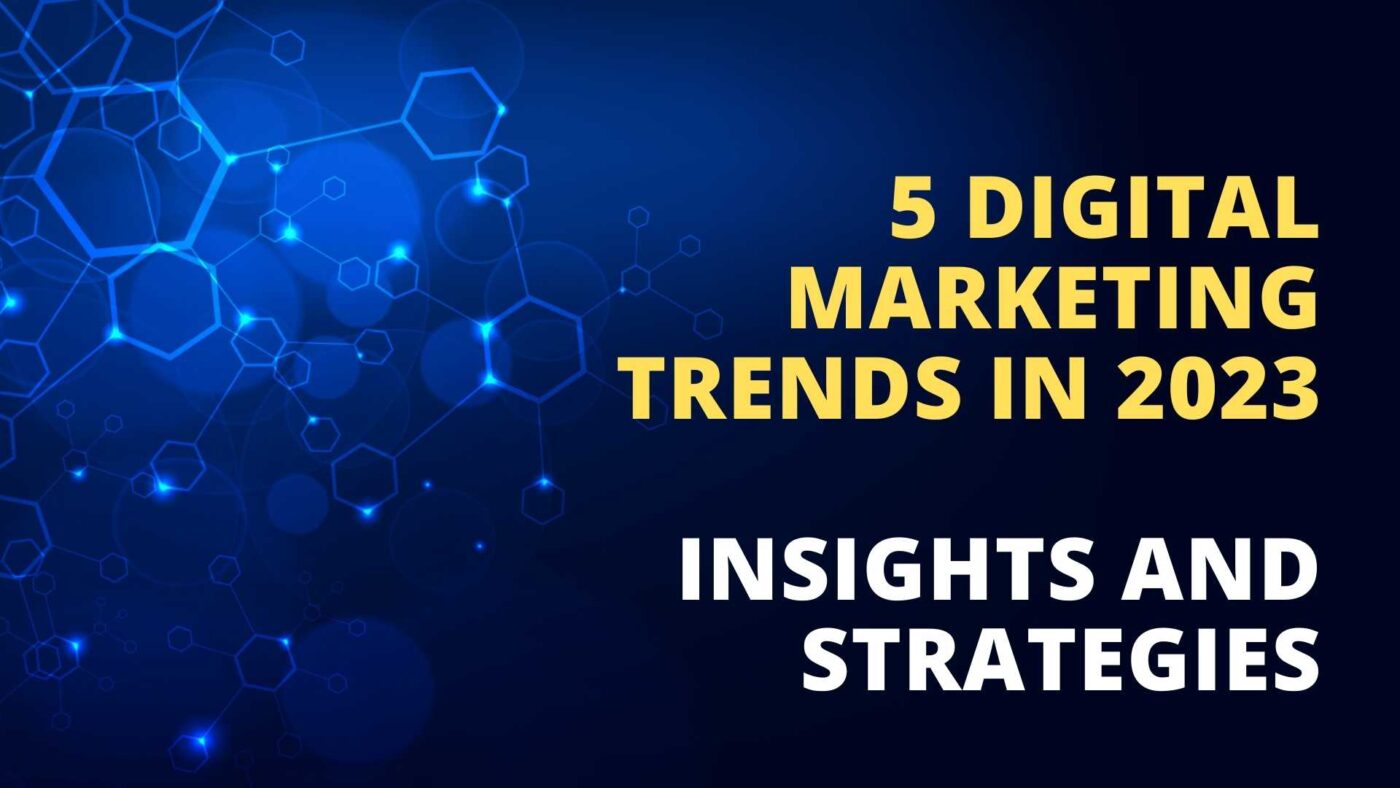Marketing
5 Digital Marketing Trends to Watch Out for in 2023: Insights and Strategies for Your Business
In today’s digital age, businesses of all sizes need to stay ahead of the curve when it comes to their digital marketing strategies. As technology evolves at a rapid pace, new digital marketing trends emerge that can help businesses better engage with their customers and drive growth. In this blog, we will explore five digital marketing trends to watch out for in 2023 and provide insights and strategies for businesses to leverage these trends to stay ahead of the competition.
Artificial Intelligence (AI) is revolutionizing the world of marketing, and businesses that embrace this technology are likely to gain a competitive advantage. AI-powered tools can help businesses better understand their customers’ behavior, preferences, and needs, enabling them to create personalized marketing campaigns that are more effective in driving engagement and conversion.
Some of the ways that businesses can leverage AI in their digital marketing strategies include:
- Chatbots: AI-powered chatbots can help businesses provide 24/7 customer support and improve customer engagement on their websites and social media channels.
- Predictive analytics: AI-powered predictive analytics tools can help businesses analyze customer data to predict their behavior and preferences, enabling them to create more targeted and personalized marketing campaigns.
- Personalization: AI-powered personalization tools can help businesses create personalized marketing messages and offers that are tailored to each customer’s preferences and needs.
Video marketing has been on the rise for several years now, and it is expected to continue to grow in popularity in 2023. Video content has been proven to be more engaging and memorable than other types of content, and businesses that incorporate video into their marketing strategies are likely to see better engagement and conversion rates.
Some of the ways that businesses can leverage video marketing in their digital marketing strategies include:
- Creating explainer videos: Explainer videos can help businesses explain their products or services in a more engaging and memorable way.
- Creating how-to videos: How-to videos can help businesses showcase their expertise and provide value to their customers.
- Live streaming: Live streaming can help businesses connect with their audience in real-time and create a sense of community around their brand.
- Influencer Marketing: Influencer marketing has become a popular digital marketing strategy in recent years, and it is expected to continue to grow in 2023. Influencers are individuals who have a large following on social media and can help businesses reach a wider audience and build brand awareness.
Some of the ways that businesses can leverage influencer marketing in their digital marketing strategies include:
- Finding the right influencers: Businesses should identify influencers who align with their brand values and have a large following in their target audience.
- Building relationships with influencers: Businesses should build authentic relationships with influencers to ensure that their partnerships are genuine and effective.
- Measuring the ROI of influencer marketing: Businesses should track the results of their influencer marketing campaigns to ensure that they are getting a good return on investment (ROI).
Voice search has been on the rise in recent years, and it is expected to continue to grow in popularity in 2023. With the rise of virtual assistants like Amazon’s Alexa and Google Home, businesses that optimize their content for voice search are likely to see better visibility and engagement.
Some of the ways that businesses can optimize their content for voice search include:
- Using natural language: Businesses should use natural language in their content to ensure that it is more easily understood by virtual assistants.
- Answering questions: Businesses should create content that answers common questions related to their industry or niche.
- Improving website speed: Businesses should ensure that their website loads quickly to improve their chances of appearing in voice search results.
Interactive content is a type of content that engages the user and requires their active participation. Interactive content can help businesses increase engagement and drive conversions by providing a more personalized and memorable user experience. Some examples of interactive content include quizzes, polls, surveys, and interactive videos.
Some of the ways that businesses can leverage interactive content in their digital marketing strategies include:
- Creating interactive content that aligns with their brand values and target audience.
- Promoting their interactive content on social media and other digital channels.
- Using interactive content to collect valuable customer data and feedback.
Hyperlinks
Here are some hyperlinks to major keywords and phrases mentioned in this blog:
- Artificial Intelligence: https://en.wikipedia.org/wiki/Artificial_intelligence
- Predictive analytics: https://en.wikipedia.org/wiki/Predictive_analytics
- Video marketing: https://www.wordstream.com/video-marketing
- Explainer videos: https://www.forbes.com/sites/forbesagencycouncil/2021/05/03/10-ways-to-leverage-explainer-videos-in-your-marketing-strategy/?sh=76a5f84f5b85
- Influencer marketing: https://influencermarketinghub.com/what-is-influencer-marketing/
- Voice search optimization: https://moz.com/blog/voice-search-seo-opportunities-challenges
- Interactive content: https://www.forbes.com/sites/forbesagencycouncil/2021/08/23/how-to-use-interactive-content-to-improve-your-digital-marketing-strategy/?sh=2050f4044c08
Conclusion
In conclusion, the digital marketing landscape is constantly evolving, and businesses that stay ahead of the curve are more likely to succeed in today’s competitive market. By leveraging AI in marketing, video marketing, influencer marketing, voice search optimization, and interactive content, businesses can create more engaging and effective digital marketing strategies. By staying on top of these trends and continuously adapting to new technologies and customer behavior, businesses can position themselves for long-term success in the digital age.
In addition to the trends discussed in this blog, there are a few other emerging trends that businesses should keep an eye on in the world of digital marketing.
One of these trends is the rise of augmented reality (AR) and virtual reality (VR) in marketing. AR and VR technologies allow businesses to create immersive and interactive experiences for their customers, which can be particularly effective in the retail and e-commerce industries. For example, a fashion retailer could use AR technology to allow customers to virtually try on clothing before making a purchase.
Another emerging trend is the increasing importance of customer experience (CX) in digital marketing. As consumers become more discerning and expect more personalized and seamless experiences from brands, businesses that prioritize CX are more likely to succeed. This means creating customer-centric digital experiences across all touchpoints, from social media to email marketing to website design.
Finally, businesses should also keep an eye on the evolving landscape of privacy and data protection regulations, such as the General Data Protection Regulation (GDPR) in Europe and the California Consumer Privacy Act (CCPA) in the United States. These regulations are changing the way that businesses collect and use customer data, and it is important for businesses to stay informed and compliant in order to build trust with their customers.
In conclusion, the world of digital marketing is constantly evolving, and businesses that stay on top of the latest trends and technologies are more likely to succeed. By leveraging AI, video marketing, influencer marketing, voice search optimization, interactive content, AR/VR, CX, and data protection regulations, businesses can create effective and engaging digital marketing strategies that drive results.

